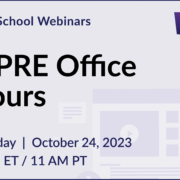What Does The MPRE Test?
What Does The MPRE Test?
The National Conference of Bar Examiners (NCBE) developed the Multistate Professional Responsibility Exam (MPRE) to test an examinee’s knowledge of the Model Rules of Professional Conduct (MRPC). The American Bar Association (ABA) creates the MPRC, which is a set of model legal ethics rules for practicing attorneys. Almost every state requires bar exam applicants to pass the MPRE as a prerequisite to becoming licensed to practice law. In this post, we explain what the MPRE tests, why you have to take it, and most importantly, how to pass!
What Does The MPRE Test?
What does the MPRE test?
The Multistate Professional Responsibility Exam (MPRE) tests a bar exam candidate’s comprehension of the Model Rules of Professional Conduct (MRPC). As we mentioned above, the MRPC is a set of legal ethical rules applicable to the professional conduct of attorneys. Based on the MRPC, the MPRE covers several different topics:
- Conflicts of interest
- Litigation and other forms of advocacy
- Lawyer-client relations
- Competence, legal malpractice, and civil liability
- Client confidentiality
- Regulation of the legal profession
- Different roles of a lawyer
- Communications about legal services
- Safekeeping funds and other property
- Transactions and communications with other persons
- Judicial conduct
- Lawyer’s duties to the public and legal systems
While some of these topics are more highly tested than others, they are all fair game on the MPRE!
Do I have to take the MPRE?
The MPRE is required to be a licensed attorney in all United States jurisdictions with the exception of Wisconsin and Puerto Rico. If you’re curious about what the jurisdiction where you want to practice requires, the NCBE includes this information their website.
Each jurisdiction establishes its own passing scaled score. These scores range from 75 to 86. So, how many questions do you need to answer correctly to obtain a passing score? We discuss this in more detail in another blog post!
What is the difference between the MRPC and a jurisdiction’s adopted rules?
States are not required to implement the MPRC word for word. In view of that, there may be differences between the MRPC and the applicable rules in a given jurisdiction. The MRPC serves as a guideline for states when states choose to create their own rules of professional conduct. If you took a Professional Responsibility class in law school, you might have covered the MRPC, and/or the rules specific to your jurisdiction. As you prepare for the MPRE, make sure you are studying the rules that will actually appear on the exam!
What is the format of the MPRE?
The MPRE is a two-hour, 60-question multiple-choice examination that applicants take via computer. The two-hour standard timeframe equates to approximately 3 minutes per question.
Examinees can request test accommodations for the MPRE, including extended testing time, a wheelchair-accessible workstation, and a separate testing room. For information about how to request MPRE test accommodations, check out the NCBE’s website. Please note that if you intend to apply for test accommodations for the MPRE, you must do so before registering for the exam!
When is the MPRE administered?
The NCBE administers the MPRE three times per year – in March, August, and November. The registration fee is $150. Here are some basic test registration details:
- March 23 or 24, 2022 exam: The recommended submission date to apply for accommodations was December 7, 2021, and the registration deadline was January 21, 2022.
- August 10 or 11, 2022 exam: The recommended submission date to apply for accommodations is April 28, 2022, and the registration deadline is June 9, 2022.
- November 14 or 15, 2022 exam: The recommended submission date to apply for accommodations is August 3, 2022, and the registration deadline is September 14, 2022.
The NCBE does not accept applications after the registration deadline, so make sure to keep track of those deadlines! Be sure to check the NCBE website for more MPRE Registration Information details.
COVID-19 and MPRE Administration?
Because of the COVID-19 pandemic, jurisdiction rules and policies are subject to change. Visit NCBE COVID-19 Updates for more information.
When should I start studying?
You should begin preparing for the MPRE 4-6 weeks prior to taking the exam. If you start studying 6 weeks prior to the exam, you could spread your studies out and spend 1-2 hours per day studying. If you start studying the week before the exam, you will likely want to set aside 6-8 hours each day for studying. Check out our blog for a sample study schedule for the MPRE! We also offer a free MPRE course!
Looking to Ace the MPRE?
- Enroll in our 5-star rated free MPRE Course, complete with expert guidance, an exclusive outline, practice questions, and a one-sheet.
- Tackle the Real MPRE questions — the gold standard for test preparation.
- Elevate your preparation with personalized MPRE private tutoring, featuring a tailored study plan and dedicated MPRE outline.
- Dive into our assortment of complimentary top-notch MPRE resources for your success.







Leave a Reply
Want to join the discussion?Feel free to contribute!